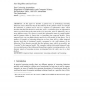Free Online Productivity Tools
i2Speak
i2Symbol
i2OCR
iTex2Img
iWeb2Print
iWeb2Shot
i2Type
iPdf2Split
iPdf2Merge
i2Bopomofo
i2Arabic
i2Style
i2Image
i2PDF
iLatex2Rtf
Sci2ools
145
click to vote
JELIA
1994
Springer
1994
Springer
Temporal Theories of Reasoning
: In this paper we describe a general way of formalizing reasoning behaviour. Such a behaviour may be described by all the patterns which are valid for the behaviour. A pattern can be seen as a sequence of information states which describe what has been derived at each time point. A transition from an information state at a point in time to the state at the (or a) next time point is induced by one or more inference steps. We choose to model the information states by partial models and the patterns either by linear time or branching time temporal models. Using temporal logic one can define theories and look at all models of that theory. For a number of examples of reasoning behaviour we have been able to define temporal theories such that its (minimal) models correspond to the valid patterns of the behaviour. These theories prescribe that the inference steps which are possible, are "executed" in the temporal model. The examples indicate that partial temporal logic is a powerfu...
Related Content
| Added | 10 Aug 2010 |
| Updated | 10 Aug 2010 |
| Type | Conference |
| Year | 1994 |
| Where | JELIA |
| Authors | Joeri Engelfriet, Jan Treur |
Comments (0)

